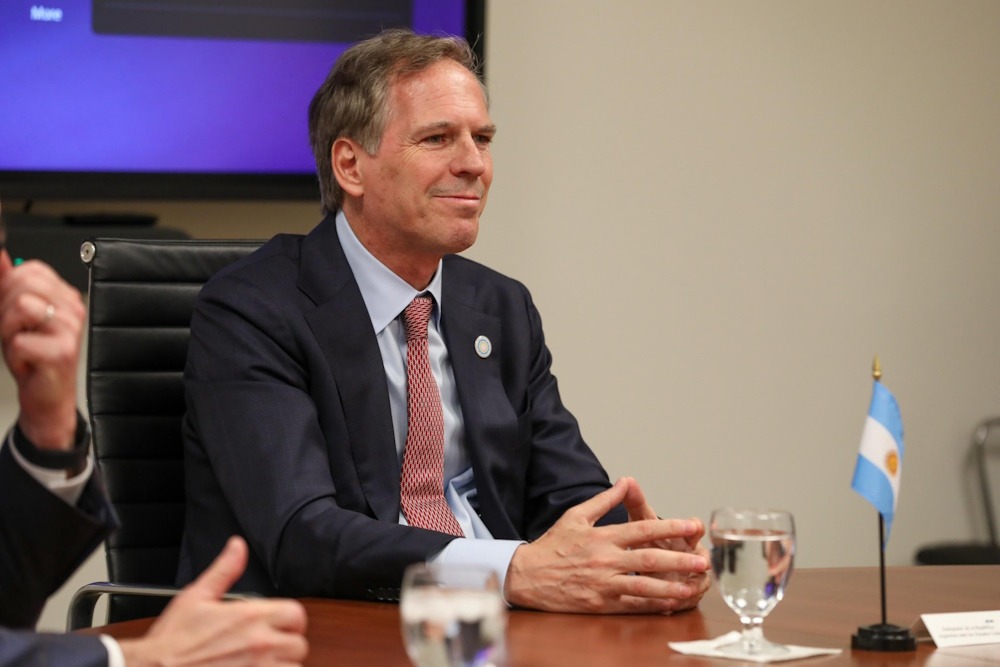This Wednesday, Argentina’s government formalised three significant appointments in the Official Gazette. Businessman Alejandro ‘Alec’ Oxenford presented his credentials to US President Donald Trump, thereby formally confirming his role as ambassador to the United States. Meanwhile, Foreign Minister Gerardo Werthein appointed a new ambassador to Germany. The appointment of diplomat Betina Pasquali de Fonseca as the new Argentine representative in Berlin might not typically attract attention, except for the notable circumstance that she succeeds Fernando Brun, who is transitioning to a pivotal role at the Palacio San Martín as Argentina’s new International Economic Relations secretary.
The position had been largely unoccupied in the Foreign Ministry’s organizational structure following the exit of Marcelo Cima in October 2024, which aligned with the substitution of former foreign minister Diana Mondino after Argentina’s vote opposing the trade embargo on Cuba that “angered” the Casa Rosada, the source of foreign policy directives. The three decrees, dated June 18, exemplify a recurring theme since Javier Milei took office: that of a “diplomatic chainsaw,” emphasizing technical and commercial profiles that align with the ideological framework of Milei’s inner circle.
Through Decree 402/2025, the executive has officially designated Alejandro Carlos Francisco Oxenford as Ambassador Extraordinary and Plenipotentiary to the United States. He had already been serving “on commission” since February; however, the Senate formally granted its approval. The ambassador has now presented his credentials to Trump, reaffirming Argentina’s intention to strengthen its strategic alliance with Washington.
Oxenford is a tech entrepreneur, the founder of DeRemate.com, and an art collector, serving as an influential figure in both the cultural and financial ecosystems. His mixed profile, devoid of diplomatic training, illustrates Milei’s strategy of favouring individuals with direct connections to the global business sphere, consistent with his radical economic liberalisation agenda.
The primary development, however, is the appointment of Fernando Brun as the new International Economic Relations secretary at the Foreign Ministry, formalised via Decree 413/2025. This is a pivotal role – the individual in this position oversees trade agreements, multilateral negotiations, and interactions with entities like Mercosur. The position has remained unoccupied or has been temporarily filled since Mondino’s exit in October 2024. The departure of Mondino resulted in the disbandment of her team, with the sole exception being Foreign Policy Secretary Eduardo Bustamante. Career diplomat Marcelo Cima was removed, and the position was temporarily assumed by Luis María Kreckler, a retired ambassador specifically appointed by Mondino.
Kreckler, who had occupied comparable roles during the Kirchner administrations, was functioning as consul in São Paulo. His tenure at the Secretariat served as a provisional measure to circumvent his ultimate exit from the Foreign Service. In the midst of the chaos, Juan Pazo – who previously served as the coordinating secretary at the Production Ministry and is regarded as an ally of Economy Minister Luis Caputo – temporarily held the position. Pazo was announced in that role only a few days earlier, but his appointment was never formalised: in December last year, the unexpected departure of Florencia Misrahi from the Foreign Ministry compelled the government to reorganise its line-up, and Pazo ultimately assumed a position at the Secretariat for Coordination within the economic portfolio.
Beginning June 18, Brun concludes his informal arrangement with a permanent appointment. In his capacity as the former Argentine ambassador to Germany, he was part of the presidential delegation that accompanied Javier Milei during his inaugural official visit to that nation in June 2024, where the head of state engaged in discussions with former German chancellor Olaf Scholz. Brun will bow become part of the core leadership of the Palacio San Martín under Gerardo Werthein’s command, alongside figures such as Francisco Tropepi (who replaced Ricardo Lagorio at the United Nations), Gerardo Díaz Bartolomé (former right-hand man to Mondino and current consul in New York), the chief-of-staff at the Foreign Ministry, Ricardo Lachterman, and Bustamante himself.
Further changes and removals are anticipated, as ambassadors strive to retain positions in pivotal locations like Brasília or Europe during the ongoing internal reorganisation. Brun is a seasoned diplomat, recognized for his significant contributions in Brazil, Germany, and at the Secretariat for Strategic Affairs during the administration of former president Alberto Fernández from 2019 to 2023. Nevertheless, his ascent was impeded for years by a faction characterized as “hard-line Kirchnerite,” notably Senator Oscar Parrilli, who resisted his progress during his collaboration with Gustavo Béliz at the Casa Rosada.
Currently, the decree bestows upon him the title of Ambassador Extraordinary and Plenipotentiary, ad honorem, solely for protocol purposes, during his tenure at the Foreign Ministry. One of his immediate responsibilities will be the national coordination of the Mercosur summit scheduled to take place in Buenos Aires on July 2 and 3. Brun possesses a degree in Political Science and International Relations from the Catholic University of Argentina (UCA) and has contributed significantly to the media discourse on trade, energy, and geopolitics. He possesses a technical profile, emphasizing business development, alongside experience in hydrogen, mining, and public–private investment projects.
The third notable appointment was that of Betina Alejandra Pasquali de Fonseca as Argentina’s new ambassador to Germany, a role formerly occupied by Brun himself. The diplomat, having previously presented credentials to the King of Norway, is 66 years old and approaching retirement. Nevertheless, he possesses a robust command of German and extensive experience in protocol.

